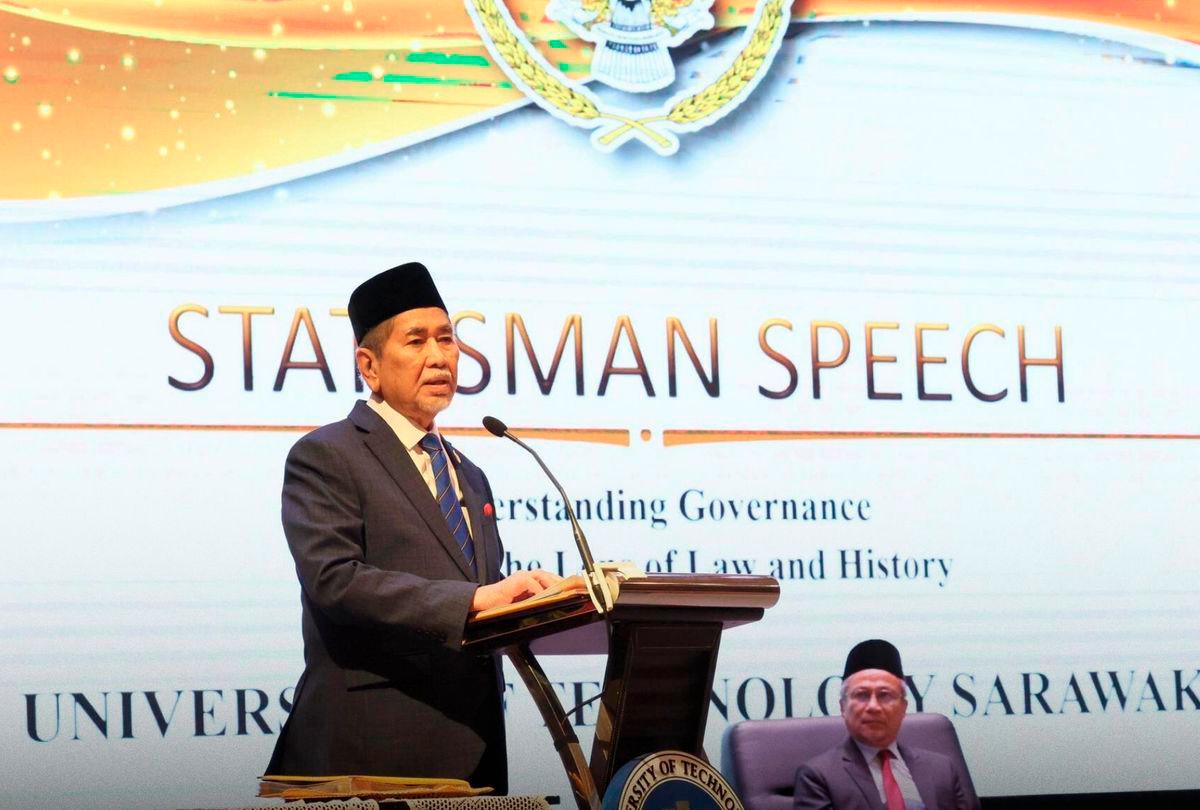SIBU: Sarawak Governor Tun Pehin Sri Dr Wan Junaidi Tuanku Jaafar emphasised that effective governance depends on a clear understanding of constitutional law and historical context.
He contrasted the United Kingdom’s doctrine of parliamentary supremacy with Malaysia’s constitutional supremacy during his Statesman’s Lecture at the University of Technology Sarawak.
He highlighted that federal and state powers are clearly defined and limited by the Federal Constitution in Malaysia.
Articles 74 to 77 delineate the Federal, State and Concurrent Lists while Article 77 places residual matters under the States.
“Over the years, questions have arisen about legislative competence whenever laws appear to stray beyond the lists,“ he said.
Such issues should be examined carefully against the Constitution and the history of the provisions involved.
Touching on Sarawak’s constitutional architecture, he said executive authority is vested in the Governor who must act on Cabinet advice.
“The Cabinet is the manager of the State. Powers flow from the Constitution to the TYT, and in practice are exercised on Cabinet advice,“ he said.
On the appointment and tenure of the Premier, he said the Governor appoints a member who commands majority confidence in the State Legislative Assembly.
Any change of leadership should be determined on the floor of the House through proper democratic processes.
He outlined Sarawak’s legislative process where State laws passed by the Assembly require the Governor’s assent.
Unlike the federal position after 1994, Sarawak did not mirror the automatic-enactment provision for legislation.
The Head of State may seek further information before assenting to legislation according to constitutional provisions.
Arguing that history illuminates intent, Tun Wan Junaidi urged policymakers to revisit original objectives of laws and programmes.
He cited national development instruments and housing policies as examples where fidelity to founding objectives matters for equitable outcomes.
On the Malaysia Agreement 1963, he recounted the historical trajectory from the Inter-Governmental Committee to constitutional amendments.
Recent recognition steps have strengthened the framework for state-federal engagement in the spirit of MA63.
“Reading the instruments and understanding why provisions exist is essential if we are to realise their original aspirations,“ he said.
Sharing personal reflections from his time helming the law portfolio, he said reforms are most durable when grounded in clear mandates.
Institutional checks and balances provide necessary safeguards for sustainable governance reforms.
He urged current and future leaders to treat public office as stewardship rather than personal privilege.
“Governance is not just about power, it is about dream, intention and purpose encoded in law. Read it. Understand it. Deliver it,“ he said.
The event also featured the launch of Wan Junaidi’s latest works ‘Teriso’s Little Star’ and ‘Silence’.
‘Teriso’s Little Star’ is inspired by his childhood experiences growing up in Kampung Pendam and Teriso.
‘Silence’ is an anthology of poems written in collaboration with Diana Ningkan and Yusuf Mustanir.
Many poems in the collection are drawn from his life experiences and personal reflections.
Dr Fetelyana Nor Pazilah moderated a talk on both books published by UTS Centre for Publication.
Panellists included Rajah Murugaiah, Nadira Abdul Rahman, Prof Dr Mohd Zainal Munshid Harun and IDr Annie Jaid Parker.
Among those present were Tun Wan Junaidi’s wife Toh Puan Fauziah Mohd Sanusi and several state ministers.
State Minister of Education, Innovation and Talent Development Datuk Seri Roland Sagah Wee Inn attended the event.
State Minister for Women, Early Childhood and Community Wellbeing Development Datuk Seri Fatimah Abdullah was also present.
State Deputy Minister of Education, Innovation and Talent Development Datuk Dr Annuar Rapaee attended as chairman of UTS Board of Directors.
UTS vice-chancellor Prof Datuk Dr Kharuddin Ab Hamid completed the distinguished guest list. – Bernama









